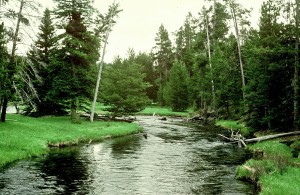Are Christians The Blame for the Earth’s Environmental Problems?
When it comes to environmentalism, Christians have an image problem. As a world-and-life view, Christianity has been targeted by many environmentalists as the “root cause” of today’s environmental and ecological problems. (See, for example, Lynn White Jr.’s article “The Historical Roots of Our Ecological Crisis” [Science, 3-10-1967]). The fallout from this has been that spiritually-minded environmentalists are turning to other religions as a source of moral and spiritual guidance in environmental activism. I’ll deal with this in future articles, but for now refuting the erroneous assumption that environmental degradation is directly related to the growth and spread of Christianity is the topic of this blog article.
Since Eden the entire human race has done irreparable damage to nature and the land. Early societies negatively impacted their environment thousands of years before industrialization. The history of the human race, following Adam and Eve’s expulsion from the Garden of Eden, reveals a steady increase in environmental exploitation that has transformed large tracts of pristine wilderness into blighted wasteland. The late Jean Dorst, former curator at the National Museum of Natural History in Paris, documented in his book, Before Nature Dies, the widespread environmental degradation that occurred over many parts of the ancient world centuries before the arrival of Europeans, including North America, Africa, Asia, the Mid East, and Australia.
Dorst’s chronology begins with primitive hunting and gathering societies. Tribal cultures purposely destroyed vast areas of wilderness with fire in order to enlarge hunting areas. This, along with hunting itself, likely hastened the extinction the mammoth, mastodon, cave bear, and ground sloth.
Several thousand years before God instructed Abram (Abraham) to set out for the land of Canaan (Genesis 12:1-5), hunting and gathering began to decline and the human race turned increasingly to herding sheep, goats and (eventually) other livestock. Like hunters and gathers, herders also burned brush and forests, although in their case the purpose was to create better forage for livestock. In the process, however, they not only destroyed native plants and eliminated forest dwelling wildlife, but they also overgrazed the land, creating habitats vulnerable to erosion. The result was that vast areas around the world, particularly in the Mediterranean region and Near East, were destroyed long before industrial civilization.
Farmers followed the herders, and damaged native environments far more extensively. In particular, primitive agriculture practices caused widespread deforestation, soil depletion, and erosion. Heavily forested areas in central and northern Europe were destroyed three to four thousand years before Christ. In Africa, where forest originally covered most of the continent, major environmental devastation began in prehistoric times. Nor were tropical regions in the New Word immune to environmental degradation. Many cultural anthropologists believe the disappearance of the Mayan Empire was probably caused by deforestation as a result of slash and burn cultivation practices.
In short, Dorst and other researches have unarguably demonstrated that non-Western, non-Christian, and non-technological people have poor environmental track records. Environmental degradation through burning native foliage, overgrazing, erosion, pollution, and the extermination plant and animal species have been widespread throughout human history—and began thousands of years before the Christian era. If the human race is more destructive today than past generations, it’s because more people inhabit the earth and have at their disposal greater technological tools for environmental exploitation. This sheds light on the true origin of today’s environmental crisis, which we’ll explore in the next article. ©
* The blog articles in this series are adapted from my book Should Christians Be Environmentalists?, published by Kregel Publications in 2012. The blog articles do not contain all the chapters, data, quotes, references, or my personal experiences, which the book includes. So, for “the rest of the story” you will need to purchase the book, which is available in both paperback and Kindle. This and the previous articles are copyrighted material and may not be reproduced in book or article form. But feel free to send links to these articles to your personal email list, Facebook friends and groups, Twitter followers, or other people who may enjoy them. I encourage interested reader to subscribe to my blog (just click on “subscribe”) or request to be added to my personal email list. This will ensure that you receive notices whenever I post a new blog article or other ministry related materials
